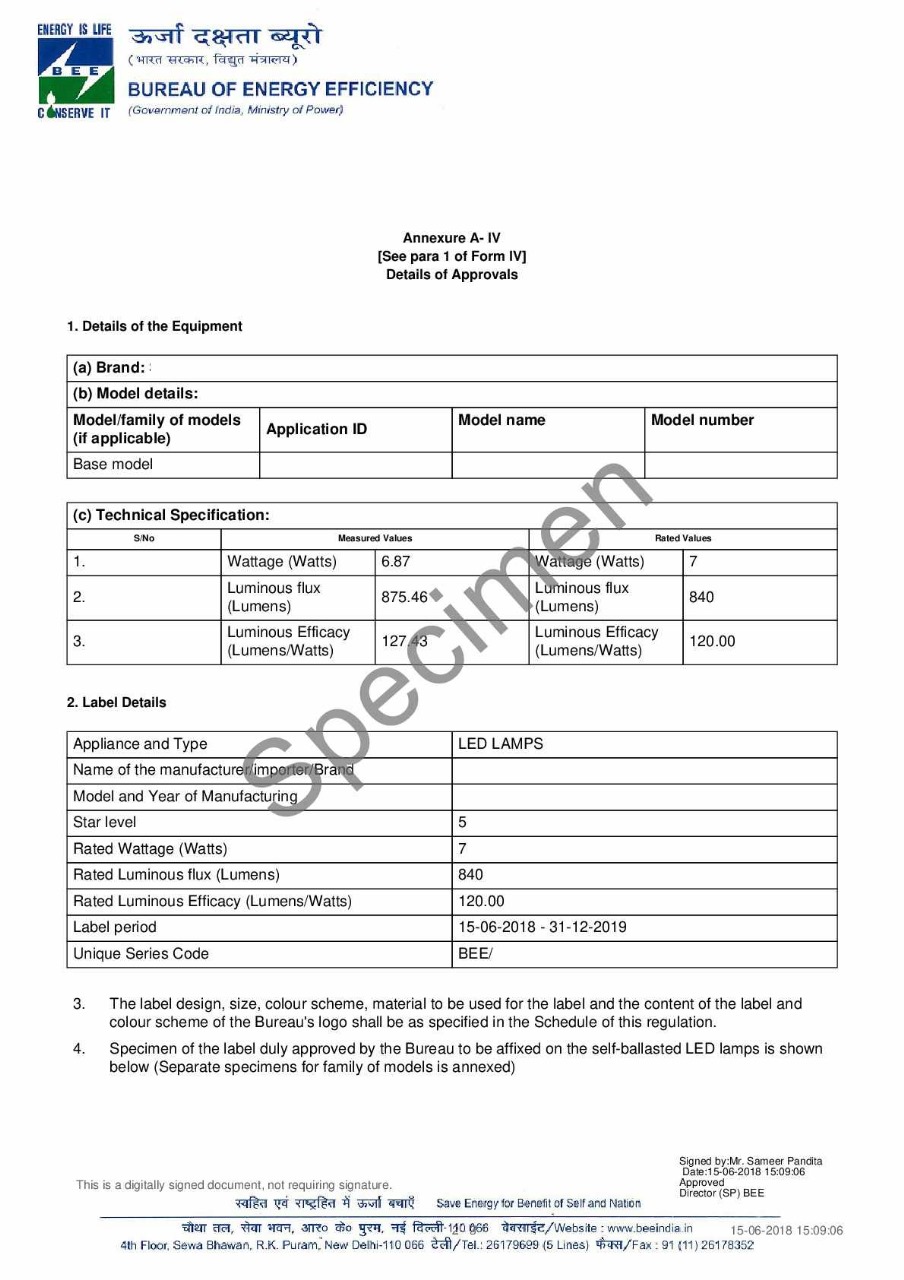BEE registration in India - Process, Documents, Fee
 The Bureau of Energy Efficiency (BEE) in India is a governmental organisation established under the Ministry of Power on March 1, 2002. It operates in accordance with the Energy Conservation Act of 2001. BEE's primary objective is to promote and facilitate energy efficiency initiatives across various sectors in the country.
The Bureau of Energy Efficiency (BEE) in India is a governmental organisation established under the Ministry of Power on March 1, 2002. It operates in accordance with the Energy Conservation Act of 2001. BEE's primary objective is to promote and facilitate energy efficiency initiatives across various sectors in the country.
It mandates energy efficiency standards, conducts awareness programs. It also issues certification to manufacturers, importers and traders of electric appliances as per BEE guidelines. It is important for all the manufacturers and traders to acquire BEE certification in order to commence their business in India.
What is BEE Registration/Certification?
The Bureau of Energy Efficiency (BEE) was established by the Indian Government under the Ministry of Power, following the Energy Conservation Act of 2001. Its primary goal is to reduce energy consumption and costs in India.
The BEE mandates star ratings and labels for specific products, helping consumers make informed energy-saving choices. BEE's mission is to institutionalise energy efficiency programs, drive in-country delivery mechanisms, and lead energy efficiency efforts across sectors.
Manufacturers, importers & traders of electrical appliances must register and undergo BEE-required testing and documentation for products to receive a Star Rating, indicating energy savings level.
Who needs a BEE Certificate?
Manufacturers: The manufacturer of the end product can register himself with the Star Labelling Scheme of BEE. But, one can only register one product only with a single brand under one login.
Importers: Any Indian company or entity that wants to import any product or item which comes under the regime of BBE obligatory Certification has to undergo the BEE registration process as per the State Labelling Scheme of BEE. But, one importer can only register only one product with a single brand under one login.
Traders: Any domestic trader trading domestically with the products that come under the regime of BEE Certification has to undergo the BEE registration process as per the State Labelling Scheme of BEE. But, one importer can only register only one product with a single brand under one login
Classification of BEE Certification
The BEE Certification is classified under two major categories
For Mandatory Appliances
- Frost Free Refrigerator
- Stationary Storage Type Electric Water Heater
- Colour Television
- Room Air Conditioner (Variable Speed)
- TFL
- LED LAMPS
- Room Air Conditioner (Fixed Speed)
- RAC (Cassette, Floor Standing Tower, Ceiling, Corner AC)
- Distribution Transformer
- Direct Cool Refrigerator
- Ceiling Fan
Documents required for the BEE Registration
Documents required For Testing Lab
- Samples along with user manual
- Legal address proof of the Manufacturing Unit: Copy of Factory License mentioning the relevant product as the scope of manufacturing and indicating the address of manufacturing unit - in English as well in original language
- Copy of BIS License with validity date and showing all applied models
Fee For BEE Registration
The fee structure of BEE registration in India is as follow
| Subject | Fees |
| Company registration(Large scale) | Rs.1,00,000 |
| Company registration(Small scale) | Rs.25,000 |
| Model registration(Per model) | Rs.2,000 |
| Label fees(Per label) | Changes depending upon the appliance |
Why do we need a BEE Certificate?
BEE promotes energy efficiency and conservation by disseminating relevant information. A BEE-rating certificate must support the level of performance and electricity consumption of a product. The certificate includes metrics for measuring the efficacy and efficiency of a product in terms of its electricity consumption.
The Bureau of Energy Efficiency's mission is to "institutionalise" energy efficiency services, enable national delivery systems, and establish a standard for energy efficiency across all economic sectors. Its primary objective is to reduce the energy intensity of the economy.
Benefits of having BEE Certificate
 Compliance
Compliance
By obtaining this form of certification, the manufacturer or industry would be guaranteed to meet all legal requirements. This certification would provide additional assurance that the producer complies with the standards of the Energy Act of 2001.
Efficiency
Industries or Manufacturers with this accreditation would guarantee a certain level of efficiency is maintained. This would guarantee respect to the energy efficiency criteria outlined in the Energy Act of 2001.
Standards:
When it comes to energy efficiency, there are specific requirements that must be met. The maintenance of such standards in accordance with legal requirements would be ensured by having this type of certification.
Reputation:
This certification would guarantee that the manufacturer or the sector was adhering to the relevant regulation
Penalty For Non-Compliance with BEE Guidelines
The penalty for not adhering to the BEE star label requirement is intended to deter manufacturers from mislabelling their products and to ensure that consumers have accurate information about the energy efficiency of the products they are buying.
Here are some of the specific penalties that can be imposed for non-compliance with the BEE star labelling requirements:
- For the first offence, a fine of up to Rs. 1 lakh can be imposed.
- For the second offence, a fine of up to Rs. 2 lakh can be imposed.
- For the third and subsequent offences, a fine of up to Rs. 5 lakhs can be imposed.
- Issue a show-cause notice to the manufacturer.
- Suspend or cancel the manufacturer's licence to sell products in India.
- Publish the name of the manufacturer in the BEE's website.
Renewal of BEE certificate
Agreement shall be renewed by the manufacturer/ permittee before the expiry of the validity of the schedule Agreement between BEE and permittee shall be renewed as per the following procedure:
-
-
- An online renewal notice shall be issued by the Bureau or its designated agency to the manufacturer through S&L web portal, before the expiry of the validity of the schedule .
- The permittee must ensure that the production data along with labelling fees for all registered models is up to date before submitting an application for renewal which should not be later than one month before the release of the alert.
- The application for renewal shall be approved by BEE within one month if the application complies to sub clause ‘b’.
- In case the agreement is not renewed on time the portal shall remain blocked till the renewal of agreement.
-
Withdrawal of BEE Certificate by permittee
A permittee may wish to discontinue the registration due to any ofthe following reasons:
-
-
-
- Inability to meet the requirements of any revision in the rating plan;
- Change in appliance/equipment design of registered appliance;
- Discontinue with the business;
- Any unforeseen circumstances, namely strike, lock out, etc.
-
-
Conclusion
In summary, BEE mandates star ratings and labels for various products to enable consumers to make informed energy-saving choices. The registration process involves mandatory and voluntary appliances, requiring manufacturers, importers, and traders to undergo BEE registration.
To register, manufacturers must submit documents and pay applicable fees. The BEE registration process involves testing, approval, and licensing, and it promotes energy conservation and efficiency. Benefits of BEE registration include legal compliance, efficiency, adherence to standards, and enhanced reputation. Non-compliance can result in fines and other enforcement actions. The BEE certificate needs to be renewed before expiry, and there is a process for withdrawing registration if needed.
BEE's efforts aim to institutionalise energy efficiency programs, drive delivery mechanisms, and lead energy efficiency initiatives across sectors, with the ultimate goal of reducing the economy's energy intensity.
Why Monitrix?
At Monitrix, we leverage our industry knowledge and expertise to help businesses navigate complex regulations, minimize risks, and optimize operations for maximum efficiency and profitability.


